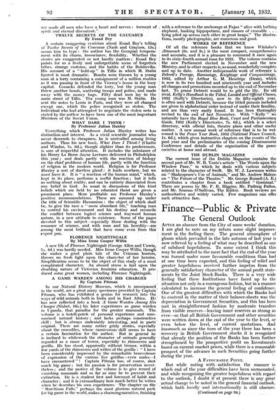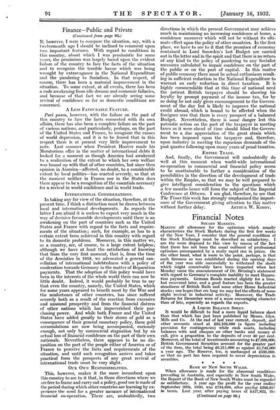Finance—Public & Private
The General Outlook
AFTER an absence from the City of some weeks' duration, I am glad to note on my return some slight improve- ment in the feeling there. The general atmosphere of gloom which prevailed in the late autumn of last year is now relieved by a feeling of what may be described as one of subdued hopefulness. To some extent I think this may be attributed to the mere fact that the end of the year was turned under more favourable conditions than had at one time been expected, and this feeling of relief and greater hopefulness received further impetus from the generally satisfactory character of the annual profit state- ments by the Joint Stock Banks. There is a very wide feeling that these Institutions have faced up to the situation not only in a courageous fashion, but in a manner Calculated to increase the general feeling of confidence. One of the greatest difficulties with which the Banks had to contend in the matter of their balance-sheets was the depreciation in Government Securities, and this has been met in straightforward fashion by moderate transfers from viSible reserves—leaving inner reserves as strong as ever—so that all British Government and other securities were written down at the end of the year to the level, or even below the level, of current quotations. And inasmuch as since the turn of the year there has been a recovery in British Government stocks it is recognized that already the position of the Banks has been further strengthened by the prospectiVe profit on Investments based on current market prices, while there is a reasonable prospect of the advance in such Securities going further during the year. - A FAVOURABLE POINT.
But while noting with: satisfaction the manner in which end of the year difficulties have been surmounted, and while recognizing the greater hopefulness with regard 'to the outltiok, I doubt if at present there is any great actual change to be noted in the general financial outlook, -which both locally and internationally is still obscure. (Confirmed on page 94.) Finance—Public and Private (Continued from page 92.)
If, however, I were to compare the situation, say, with a twelvemonth ago I should be inclined to comment upon two important features. With regard to conditions in this country, about which I was pessimistic for some years, the pessimism was largely based upon the evident failure of the country to face the facts of the situation and to recognize the terrible havoc which was being wrought by extravagance in the National Expenditure and the pandering to Socialism. In that respect, of course, there has been a material improvement in the situation. To some extent, at all events, there has been a rude awakening from idle dreams and economic fallacies, and because of that fact we are already seeing some revival of confidence so far as domestic conditions arc concerned.
A LESS FAVOURABLE FEATURE.
Pari passe, however, with the failure on the part of this country to face the facts connected with its own affairs, there has also been a complete failure on the part of various nations, and particularly, perhaps, on the part of the United States and France, to recognize the causes of world depression, and it is to be feared that in this respect there is at present very little improvement to note. Last summer when President Hoover made his Moratorium offer in the matter of international debts it looked for a moment as though America had awakened to a realization of the extent to which her own welfare was bound up with that of other countries, but since then opinion in America—affected, no doubt, to a considerable extent by local politics—has reacted severely, so that at the moment neither in France nor in the States does there appear to be a recognition of the essentials necessary for a revival in world confidence and in world trade.
INTERNATIONAL CONSIDERATIONS.
In taking any far view of the situation, therefore, at the present time, I think a distinction must be drawn between local and international developments. As regards the latter I am afraid it is useless to expect very much in the way of decisive favourable developments until there is an awakening on the part of countries such as the United States and France with regard to the facts and require- ments of the situation ; such, for example, as has to a certain extent been achieved in this country with regard to its domestic problems. Moreover, in this matter we, as a country, are, of course, to a large extent helpless ; although we have at least the satisfaction of knowing that from the very first moment, that is, from the time of the Armistice in 1918, we advocated a general can- cellation of international indebtedness with a policy of moderation towards Germany in the matter of Reparation payments. That the adoption of this policy would have been in the interests of the whole world there can now be little doubt. Indeed, it would probably be true to say that even the country, namely, the United States, which for some years appeared to benefit most by the War and the misfortunes of other countries, has since suffered severely both as a result of the reaction from excessive and unsound prosperity and from the financial distress of other nations which has impoverished their pur- chasing power. And while both France and the United States have added greatly to their stores of gold as a consequence of their general monetary policy, these gold accumulations are now being accompanied, curiously enough, not only by commercial stagnation but by an actual loss of financial confidence on the part of their own nationals. Nevertheless, there appears to be no dis- position on the part of the people either of America or of France to perceive the facts and requirements of the situation, and until such recognition arrives and takes practical form the prospects of any great revival of international trade must be very slight.
OUR OWN RESPONSIBILITIES.
This, however, makes it the more incumbent upon this country to see to it that, in those directions where we are free to frame and carry out a policy, good use is made of the period during which other countries are learning by ex- perience the need for a greater measure of international financial co-operation. There arc, undoubtedly, two
directions in which the present Government may achieve much in maintaining an increasing confidence at home, a confidence moreover which will not be without its ulti- mate effect upon the policy of other countries. In the first place, we have to see- to-it that-the promises of economy contained in Lord Snowden's last Budget are carried out in the letter and in the spirit and that there is no return of any kind to the policy of pandering to any Socialist measures calculated to impair confidence on the part of the public or on the part of capital. In this matter of public economy there must be actual enthusiasm result- ing in sufficient reduction in the National Expenditure to warrant an early reduction in direct taxation. It is highly commendable that at this time of national need the patient British taxpayer should be showing his loyalty by prompt payment of the income tax, for by so doing he not only gives encouragement to the Govern- ment of the day but is likely to improve the national credit abroad, which is bound to be affected when the foreigner sees that there is every prospect of a balanced Budget. Nevertheless, there is some danger lest this patriotic action on the part of the taxpayer in meeting taxes as it were ahead of time should blind the Govern- ment to a due appreciation of the great strain which has been imposed upon the taxpayer and, therefore, upon industry in meeting the rapacious demands of the past quarter following upon many years of penal taxation.
EMPIRE TRADE.
And, finally, the Government will undoubtedly do well at this moment when world-wide international co-operation in commercial and financial policy seems to be unattainable to further a consideration of the possibilities in the direction of the development of trade within the Empire, so that we may be well prepared to give intelligent consideration to the questions which a few months hence will form the subject of the Imperial Conference at Ottawa. I am glad, therefore, to see that The Times this week has strongly emphasized the import- ance of the Government giving attention to this matter



































 Previous page
Previous page